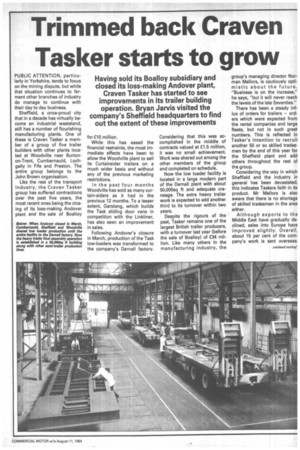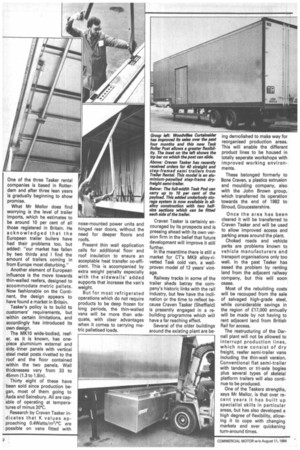Trimmed back Craven Tasker starts to grow
Page 33

Page 34

If you've noticed an error in this article please click here to report it so we can fix it.
Having sold its Boalloy subsidiary and closed its loss-making Andover plant, Craven Tasker has started to see improvements in its trailer building operation. Bryan Jarvis visited the company's Sheffield headquarters to find out the extent of these improvements
PUBLIC ATTENTION, particularly in Yorkshire, tends to focus on the mining dispute, but while that situation continues to ferment other branches of industry do manage to continue with their day to day business.
Sheffield, a once-proud city that in a decade has virtually become an industrial wasteland, still has a number of flourishing manufacturing plants. One of these is Craven Tasker a member of a group of five trailer builders with other plants located at Woodville near Burtonon-Trent, Cumbernauld, Lochgelly in Fife and Preston. The entire group belongs to the John Brown organisation.
Like the rest of the transport industry, the Craven Tasker group has suffered contractions over the past five years, the most recent ones being the closing of its loss-making Andover plant and the sale of Boalloy for £10 million.
While this has eased the financial restraints, the most immediate effects have been to allow the Woodville plant to sell its Curtainsider trailers on a much wider basis and without any of the previous marketing restrictions.
In the past four months Woodville has sold as many curtain-siders as it had in the previous 12 months. To a lesser extent, Garstang, which builds the Task sliding door vans in competition with the Linkliner, has also seen an improvement in sales.
Following Andover's closure in March, production of the Task low-loaders was transformed to the company's Darnall factory. Considering that this was accomplished in the middle of contracts valued at £1.5 million, it was no small achievement. Work was shared out among the other members of the group and completed on schedule.
Now the low loader facility is located in a large modern part of the Darnall plant with about 50,000sq ft and adequate craneage. The extra heavy trailer work is expected to add another third to its turnover within two years.
Despite the rigours of the past, Tasker remains one of the largest British trailer producers, with a turnover last year (before the sale of Boalloy) of £34 million. Like many others in the manufacturing industry, the group's managing director Norman Mellors, is cautiously optimistic about the future. "Business is on the increase," he says, "but it will never reach the levels of the late Seventies."
There has been a steady influx of orders for trailers — orders which were expected from the rental companies and large fleets, but not in such great numbers. This is reflected in Tasker's intention to recruit another 50 or so skilled tradesmen by the end of this year for the Sheffield plant and add others throughout the rest of the group.
Considering the way in which Sheffield and the industry in general has been devastated, this indicates Taskers faith in its product. Mr Mellors is also aware that there is no shortage of skilled tradesmen in the area either.
Although exports to the Middle East have gradually declined, sales into Europe have improved slightly. Overall, about 15 per cent of the company's work is sent overseas One of the three Tasker rental companies is based in Rotterdam and after three lean years is gradually beginning to show promise.
What Mr Mellor does find worrying is the level of trailer imports, which he estimates to be around 10 per cent of all those registered in Britain. He acknowledged that the European trailer builers have had their problems too, but added: "our market has fallen by two thirds and I find the amount of trailers coming in from Europe most disturbing."
Another element of European influence is the move towards thin-walled reefers, designed to accommodate metric pallets. Now fashionable on the Continent, the design appears to have found a market in Britain.
Tasker's policy is to build to customers' requirements, but within certain limitations, and accordingly has introduced its own design.
The MK10 wide-bodied, reefer, as it is known, has onepiece aluminium external and side timer panels with vertical steel metal posts rivetted to the roof and the floor contained within the two panels. Wall thicknesses vary from 33 to 45mm (1.3 to 1.8in).
Thirty eight of these have been sold since production began, most of them going to Asda and Sainsbury. All are capable of operating at temperatures of minus 20°C.
Research by Craven Tasker indicates that K values approaching 0.4Watts/m2/°C are possible on vans fitted with
nose-mounted power units and hinged rear doors, without the need for deeper floors and roofs.
Present thin wall application calls for additional floor and roof insulation to ensure an acceptable heat transfer co-efficient. This is accompanied by extra weight penalty especially with the sidewalls' added supports that increase the van's weight.
But for most refrigerated operations which do not require products to be deep frozen for long periods, the thin-walled vans will be more than adequate, with clear advantages when it comes to carrying metric palletised loads. Craven Tasker is certainly encouraged by its prospects and is pressing ahead with its own version firm in the belief that future development will improve it still further.
In the meantime there is still a market for CT's MK9 alloy-rivetted Task cold van, a well proven model of 12 years' vintage.
Railway tracks in some of the trailer sheds betray the company's historic links with the rail industry, but few have the inclination or the time to reflect be cause Craven Tasker (Sheffield) is presently engaged in a re building programme which will have a far reaching effect. Several of the older buildings around the existing plant are be ing demolished to make way for reorganised production areas. This will enable the different product lines to be housed in totally seperate workshops with improved working environments.
These belonged formerly to Bone Craven, a plastics extrusion and moulding company, also with the John Brown group, which transferred its operation towards the end of 1982 to Stroud, Gloucestershire.
Once the area has been cleared it will be transferred to Craven Tasker and will be used to allow improved access and parking areas around the plant.
Choked roads and vehicle parks are problems known to vehicle manufacturers and transport organisations only too well. In the past Tasker has eased the problem by renting land from the adjacent railway company, but this will soon cease.
Most of the rebuilding costs will be recouped from the sale of salvaged high-grade steel, while considerable savings in the region of £17,000 annually will be made by not having to rent adjacent land from British Rail for access.
The restructuring of the Darnall plant will not be allowed to interrupt production lines, which now consist of dry freight, reefer semi-trailer vans including the thin-wall version. Conventional flat semi-trailer with tandem or tri-axle bogies plus several types of skeletal platform trailers will also continue to be produced.
One of the Taskers strengths, says Mr Mellor, is that over recent years it has built up specialist skills in particular areas, but has also developed a high degree of flexibility, allowing it to cope with changing markets and ever quickening turn-around times.




















































































